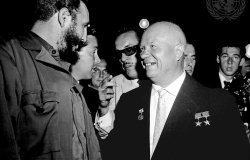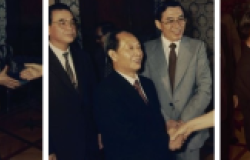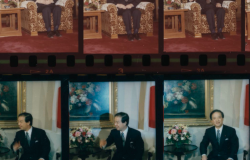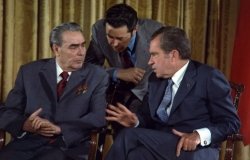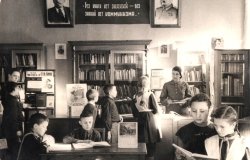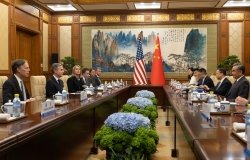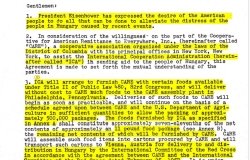Work in Progress Presentation: U.S. Policy Toward Trade Liberalization, Sino-American Economic Relations, and China's Road to "Reform and Opening," 1969-1976
On April 14th, 1971, President Richard Nixon announced an end to the U.S.-led embargo on the People's Republic of China, a step which marked the beginning of Sino-American economic normalization and a new direction for U.S. foreign policy despite the absence of diplomatic relations with Beijing. During a work in progress presentation, Wilson Center Public Policy Scholar Dai Chaowu assessed the U.S. policy toward trade liberalization as an important element in Nixon's diplomacy and as a critical means of turning détente into a practical reality.
Overview
On April 14th, 1971, President Richard Nixon announced an end to the U.S.-led embargo on the People's Republic of China, a step which marked the beginning of Sino-American economic normalization and a new direction for U.S. foreign policy despite the absence of diplomatic relations with Beijing. During a work in progress presentation, Wilson Center Public Policy Scholar Dai Chaowu assessed the U.S. policy toward trade liberalization as an important element in Nixon's diplomacy and as a critical means of turning détente into a practical reality. According to Dai, this policy paved the road for Sino-U.S. rapprochement and also influenced China's development by providing an opportunity to import new technology and equipment from the West. This played a key role in China's modernization and placed the PRC on the path to "Reform and Opening" later in the decade.
According to Dai, Nixon recognized the rapidly changing patterns in world trade and responded by liberalizing U.S. trade policies. Four factors in particular contributed to Nixon's reappraisal of U.S. trade policy: first, the interdependence of the global economy had become a reality; second, a number of foreign countries could openly compete with the United States in the world market; third, the U.S.' traditional surplus in the balance of trade had disappeared; and fourth, less developed countries needed improved access to the markets of industrialized countries if their economic development plans were to continue. In Dai's view, Nixon's economic diplomacy evolved after a careful assessment of U.S. policies towards communist Europe and Asia. A team of foreign policy planners, including Henry Kissinger, reformulated the administration's approach towards trade liberalization in order to improve and enlarge trade of nonstrategic commodities with the Soviet Bloc and communist Asia. According to Dai, Nixon believed that China was a rising economic power and personally encouraged U.S. business groups to invest there. For example, in 1972 Nixon facilitated a $150 million deal between Boeing and the PRC.
Nixon's trade liberalization was instrumental in the Sino-American rapprochement. According to Dai, it became the cornerstone of a Nixon-Kissinger strategy towards China, shifting the focus from confrontation towards reconciliation and peaceful relations. Nixon's economic diplomacy ushered in a new era of cooperation and peaceful negotiations by extending a hand to China and the Soviet Union.
Dai also stressed that the influence of the new trade relationship with the U.S. contributed to dramatic changes in Chinese domestic politics. It was a significant factor in bringing an end to the Cultural Revolution and in helping usher in a new and more dynamic period of development. Foreign trade expanded and new technologies were imported. This gradually led to a shift in the pattern of Chinese foreign trade. Chinese foreign policy expanded to the West as Chinese leaders became increasingly aware of the benefits of open markets and free trade. Their goal was to bring China back to the international system. As Dai noted, Deng Xiaoping later claimed that without the groundwork laid by the U.S. and Chinese leadership in the late 1960s and early 1970s, China could have experimented with certain reforms, but would not have reached the same level of progress.
In conclusion, Dai argued that trade liberalization and the Sino-U.S. rapprochement improved the position of the U.S. in the global Cold War. China's opening seemingly asserted the sustainability and dominance of the U.S. growth model. China's rapid industrialization and adoption of the American model for development, Dai said, dealt a blow to Soviet prestige. Dai suggested that rapprochement was part of a greater pursuit to extend U.S. power and influence world-wide.
Drafted by Kristina Terzieva, Program Assistant and James Person, Program Associate
Christian Ostermann, Director, History and Public Policy Program
Speakers
Hosted By

Cold War International History Project
The Cold War International History Project supports the full and prompt release of historical materials by governments on all sides of the Cold War. Through an award winning Digital Archive, the Project allows scholars, journalists, students, and the interested public to reassess the Cold War and its many contemporary legacies. It is part of the Wilson Center's History and Public Policy Program. Read more

History and Public Policy Program
The History and Public Policy Program makes public the primary source record of 20th and 21st century international history from repositories around the world, facilitates scholarship based on those records, and uses these materials to provide context for classroom, public, and policy debates on global affairs. Read more

Indo-Pacific Program
The Indo-Pacific Program promotes policy debate and intellectual discussions on US interests in the Asia-Pacific as well as political, economic, security, and social issues relating to the world’s most populous and economically dynamic region. Read more

North Korea International Documentation Project
The North Korea International Documentation Project serves as an informational clearinghouse on North Korea for the scholarly and policymaking communities, disseminating documents on the DPRK from its former communist allies that provide valuable insight into the actions and nature of the North Korean state. It is part of the Wilson Center's History and Public Policy Program. Read more

Kissinger Institute on China and the United States
The Kissinger Institute works to ensure that China policy serves American long-term interests and is founded in understanding of historical and cultural factors in bilateral relations and in accurate assessment of the aspirations of China’s government and people. Read more
Thank you for your interest in this event. Please send any feedback or questions to our Events staff.

